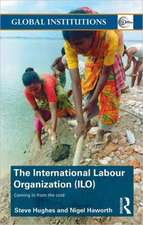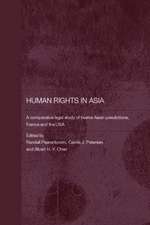Environmental and Human Security in the Arctic
Editat de Gunhild Hoogensen Gjørv, Dawn Bazely, Marina Goloviznina, Andrew Tanentzapen Limba Engleză Paperback – 14 oct 2024
The book reviews the potential threats to security, putting them in an analytical framework and indicating a clear path for solutions.Contributions come from natural, social and humanities scientists, hailing from Canada, Russia, Finland and Norway.
Environmental Change and Human Security in the Arctic is an essential resource for policy-makers, community groups, researchers and students working in the field of human security, particularly for those in the Arctic regions.
| Toate formatele și edițiile | Preț | Express |
|---|---|---|
| Paperback (1) | 259.91 lei 3-5 săpt. | +27.15 lei 7-11 zile |
| Taylor & Francis – 14 oct 2024 | 259.91 lei 3-5 săpt. | +27.15 lei 7-11 zile |
| Hardback (1) | 1010.26 lei 6-8 săpt. | |
| Taylor & Francis – 4 oct 2013 | 1010.26 lei 6-8 săpt. |
Preț: 259.91 lei
Nou
Puncte Express: 390
Preț estimativ în valută:
49.73€ • 51.93$ • 41.07£
49.73€ • 51.93$ • 41.07£
Carte disponibilă
Livrare economică 25 martie-08 aprilie
Livrare express 11-15 martie pentru 37.14 lei
Preluare comenzi: 021 569.72.76
Specificații
ISBN-13: 9781032923451
ISBN-10: 1032923458
Pagini: 310
Ilustrații: 5
Dimensiuni: 156 x 234 x 23 mm
Greutate: 0.57 kg
Ediția:1
Editura: Taylor & Francis
Colecția Routledge
Locul publicării:Oxford, United Kingdom
ISBN-10: 1032923458
Pagini: 310
Ilustrații: 5
Dimensiuni: 156 x 234 x 23 mm
Greutate: 0.57 kg
Ediția:1
Editura: Taylor & Francis
Colecția Routledge
Locul publicării:Oxford, United Kingdom
Public țintă
Academic and Professional Practice & DevelopmentCuprins
Foreword: Remarks by former Canadian Ambassador to Norway, Shirley Wolff Serafini at the Human Security in the Arctic Seminar (May 2004) 1. Introduction: Can we broaden our understanding of security in the Arctic? PART 1: Differing Conceptions of Security in the Arctic 2. Cold War legacies in Russia’s Svalbard policy 3. A new northern security: Environmental degradation and risks, climate change, energy security, trans-nationalism and flows of globalization and governance 4. Virtuous imperialism or a shared global objective?: The relevance of human security in the global North PART 2: Environmental Security 5. The sustainability transition: Governing coupled human/natural systems 6. Arctic environmental security and abrupt climate change 7. Climate change impacts, adaptation, and the technology interface 8. Bridging the GAPS between ecology and human security PART 3: Health Security 9. Telemedicine as a tool for improving human security 10. Health and human security: Communicable diseases in the post-Soviet Arctic PART 4: Human Security: Women and Indigenous Groups 11. Aboriginal self-determination and resource development activity: improving human security in the Canadian Arctic? 12. Women’s participation in decision making: human security in the Canadian Arctic 13. Human security and women’s security reality in Northwest Russia 14. The political exclusion and commodification of women 15. Conclusion: Revisiting Arctic security
Recenzii
"Environmental and human security in the Arctic opens up and presents many timely and important issues that solidify the non-military approach to security". - Nikolas Sellheim, University of Lapland, Finland
Notă biografică
Gunhild Hoogensen is Associate Professor in International Relations at the University of Tromsø , Norway.
Dawn Bazely is Professor of Biology at York University, Toronto and is Director of IRIS, the university's Institute for Research and Innovation in Sustainability (2006-11, 2012-13). Trained in the ecological field of plant-animal interactions, at the universities of Toronto and Oxford, she has carried out extensive field research in grasslands and forests, from temperate to arctic regions. She led the Canadian section of the International Polar Year project, GAPS, Gas, Arctic Peoples and Security, and recently spent her sabbatical as a Charles Bullard Fellow at Harvard Forest, Harvard University.
Marina Goloviznina is a post-doctoral fellow at the University of Tromsø in the Department of Sociology, Political Science and Community Planning.
Andrew Tanentzap is Banting Fellow at York University in the Department of Biology.
Dawn Bazely is Professor of Biology at York University, Toronto and is Director of IRIS, the university's Institute for Research and Innovation in Sustainability (2006-11, 2012-13). Trained in the ecological field of plant-animal interactions, at the universities of Toronto and Oxford, she has carried out extensive field research in grasslands and forests, from temperate to arctic regions. She led the Canadian section of the International Polar Year project, GAPS, Gas, Arctic Peoples and Security, and recently spent her sabbatical as a Charles Bullard Fellow at Harvard Forest, Harvard University.
Marina Goloviznina is a post-doctoral fellow at the University of Tromsø in the Department of Sociology, Political Science and Community Planning.
Andrew Tanentzap is Banting Fellow at York University in the Department of Biology.
Descriere
This is the first comprehensive exploration of why human security is relevant to the Arctic and what achieving it can mean, covering the areas of health of the environment, identity of peoples, supply of traditional foods, community health, economic opportunities, and political stability.









